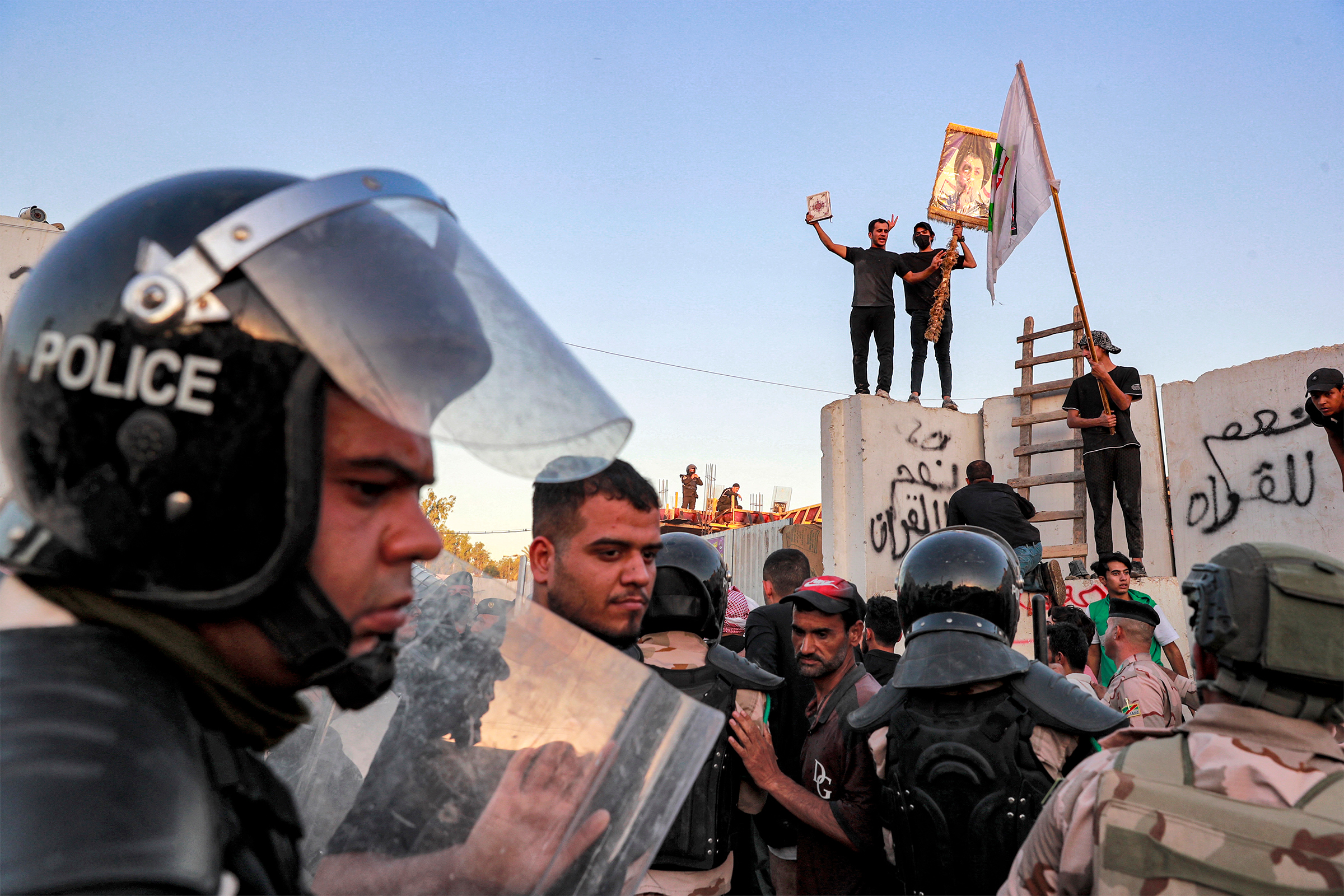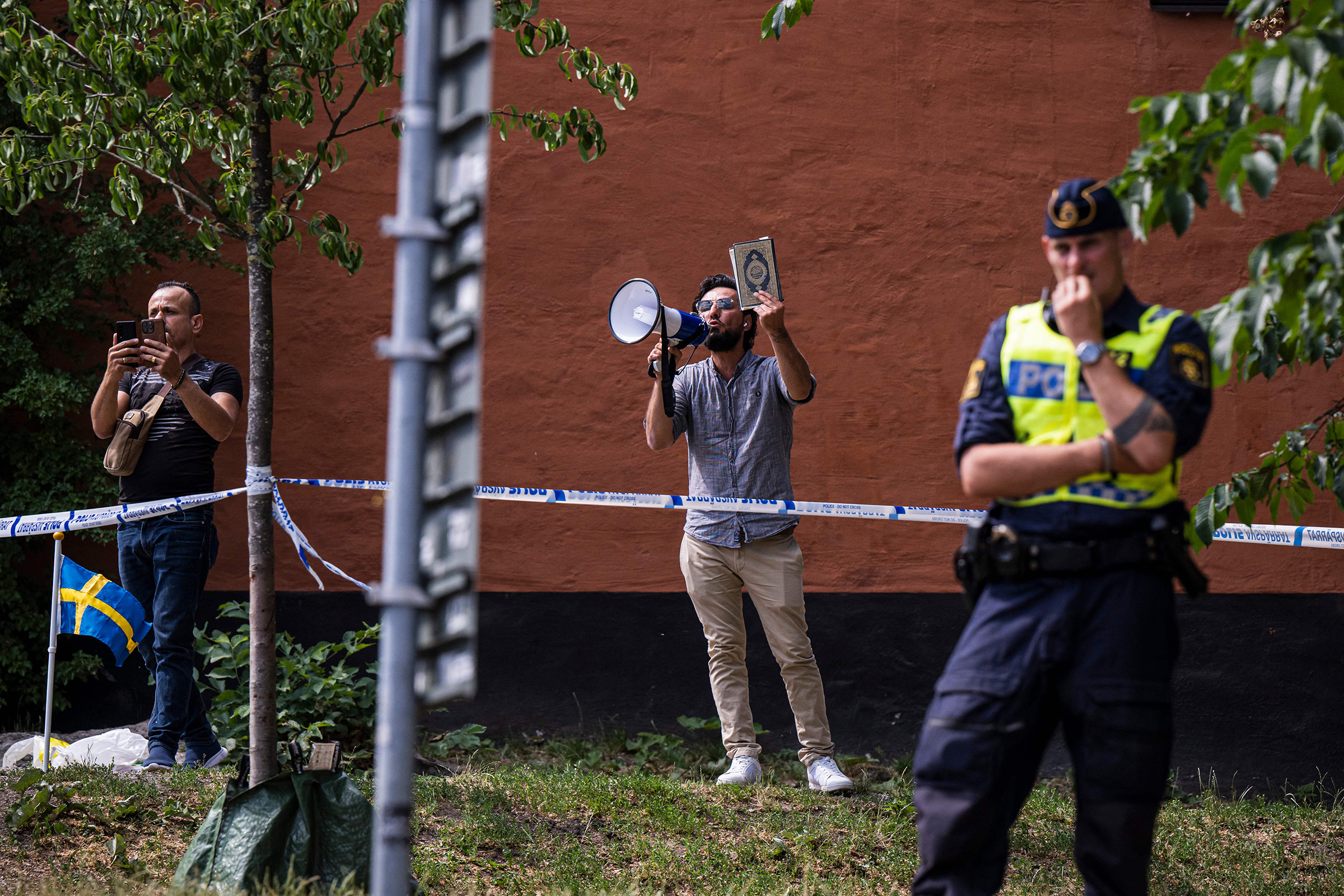
Sweden is expected to raise its terror threat level following a spate of Quran-burning incidents in recent months that has sparked anger in Muslim-majority countries, Dagens Nyheter reported on Thursday.
The terror threat level will rise from three to four on a five-point scale, which implies a "high" threat.
The decision comes just days after two men at the heart of a months-long debate over Quran burning set the Islamic holy book aflame on Monday outside Stockholm's Royal Palace.
Salwan Momika, 37, and Salwan Najem, 48, burned a copy of the Quran as counter-protesters called for them to “extinguish their hate.” Sweden and its Nordic peer Denmark have been grappling with how to address what some see as an act of protected free speech and others a symbol of religious hatred and xenophobia.
Quran-burning incidents in Sweden and Denmark may be a tiny phenomenon, but they have made leaders in northern Europe anxious. “We are currently in the most serious security situation since the Second World War,” Swedish Prime Minister Ulf Kristersson said last month, following a conversation with his Danish counterpart Mette Frederiksen, regarding the issue.
Turkish President Recep Tayyip Erdoğan spent months holding up Sweden’s NATO membership bid in part over the matter, before agreeing last month to lift his country's veto.
More From TIME
There have also been protests against Quran-burning in various Muslim-majority countries. Last month, protesters in Iraq stormed the Swedish embassy, expelling the ambassador and torching the compound after Momika burned the Quran outside a mosque in Stockholm. The Iraqi prime minister, Mohammed Shia al-Sudani, even expelled Sweden’s ambassador and suspended the work permit of Swedish telecom company Ericsson over the incident.
“The key challenge for the Danish and Swedish governments is currently really to navigate the dilemma between minimizing the risk for terrorist attacks and repairing their diplomatic relationships with the Muslim world, while at the same time being exposed to massive domestic criticism and accusations of giving in to pressure from foreign powers,” Dino Krause, a researcher at the Danish Institute for International Studies (DIIS), tells TIME.
As the issue continues to boil over, here’s what to know.
Who has burned copies of the Quran?
The recent controversy around Quran-burning emerged after Rasmus Paludan, a Danish-Swedish far-right extremist, destroyed a copy outside Turkey’s embassy in Stockholm in January, and then Turkey’s embassy in Copenhagen later that month.

Others soon followed in Paludan’s footsteps, including Momika, an Iraqi refugee who was previously linked to extremist Christian militias while living in Iraq. Since June, Momika has on several occasions obtained permits for Quran-burning protests and carried them out in Stockholm.
In July, two members of the ultranationalist group Danske Patrioter, or Danish Patriots, live-streamed their own Quran-burning in front of the Iraqi embassy in Copenhagen. Earlier this month, members of the group also burned copies of the Quran and chanted anti-Islam slogans outside the embassies of Turkey, Algeria, Pakistan, Iran, and Indonesia.
What are Sweden and Denmark's laws around Quran-burning?
Denmark and Sweden have laws that prohibit hate speech, but many argue that there is a line between attacking a faith and attacking observers of that faith. “We have laws against inciting racial hatred, but according to the currently dominant interpretation, it seems that they do not apply to symbolic attacks against religions," says Mattias Wahlström, a professor of sociology at Sweden's University of Gothenburg.
Both countries have abolished their centuries-old blasphemy laws in recent years. In 2017, Denmark abolished the blasphemy provision in the Danish Penal Code after a vote in parliament. “Even before it was abolished, this law had already been used extremely restrictively… and, for instance, did not prevent even more controversial forms of religious criticism, such as the caricatures of the prophet Muhammad that were printed in Denmark’s biggest newspaper Jyllands Posten in 2005,” says DIIS's Krause.
But Krause adds that some speech remains prohibited in Denmark, including burning other countries' flags, openly supporting terrorism, or insulting the monarch. The Danish government has suggested it would be open to reforming the laws around Quran-burning.
Sweden abolished its blasphemy laws in the 1970s and freedom of expression has been “strongly protected” in the Swedish constitution, Wahlström says. “Any public protest enjoys protection from the constitution, even in situations where there is no prior demonstration permit.”
Sweden’s government has said it has no legal recourse to prevent further Quran-burnings. But officials say they will consider reforms to Sweden’s Public Order Act that would enable police to stop Quran burnings if there is a clear threat posed to national security.
Is Islamaphobia on the rise?
The number of people who are burning copies of the Quran remains small. But the sharing of videos and livestream footage of such incidents has given them outsized attention. Mohammad Fazlhashemi, a professor of Islamic theology and philosophy at Sweden’s Uppsala University, tells TIME that these videos can appear to legitimize the views of a tiny minority.
“It is taken as proof that the reason for this is the widespread Islamophobia in Sweden,” Fazlhashemi says. “For them, it does not seem to matter that Sweden's Foreign Minister Tobias Billström condemns the Quran burnings and describes them as an expression of Islamophobia.” Fazlhashemi adds that while the government does not endorse these attitudes, various political leaders have expressed contempt for the religion.
Still, polls suggest that many Swedes are opposed to the Quran-burnings. According to a survey carried out by Kantar Public in July, a majority of Swedes support a ban on the burning of any religious text.
Why are Nordic leaders concerned?
“Both Danish and Swedish authorities have been warned by their intelligence services about heightened risks for terrorist attacks both within their countries and against state-associated targets abroad,” says DIIS's Krause.
By appearing lenient on Quran burnings, Sweden and Denmark risk alienating Muslim-majority countries. Yet experts also tell TIME that the leaders of some Muslim countries have used outrage over the issue to further their own interests.
"In the case of Sweden, the role played by President Erdoğan was certainly crucial in amplifying the issue, because he used Quran burnings that occurred in January 2023 in Sweden to leverage his negotiating position over Sweden’s admission into NATO,” says Krause. In exchange for lifting his veto over Sweden’s membership, Erdoğan secured concessions including lifting bans on some arms sales to Turkey.
Fazlhashemi also cites the case of Iraqi Shia cleric Muqtada al-Sadr, who he says has used the issue of Quran burning to boost his support ahead of elections this year. Hundreds of followers of Sadr were behind the storming of the Swedish embassy in Baghdad.
Fazlhashemi adds that the Quran burnings are an opportunity for these political leaders to "deflect" from domestic problems. "The same political leaders who take chest tones against the Quran burnings in Sweden and Denmark are silent against China's oppression of its Muslim population,” he says.
More Must-Reads from TIME
- Cybersecurity Experts Are Sounding the Alarm on DOGE
- Meet the 2025 Women of the Year
- The Harsh Truth About Disability Inclusion
- Why Do More Young Adults Have Cancer?
- Colman Domingo Leads With Radical Love
- How to Get Better at Doing Things Alone
- Michelle Zauner Stares Down the Darkness
Write to Armani Syed at armani.syed@time.com